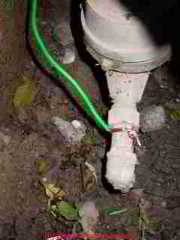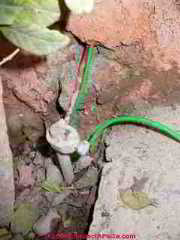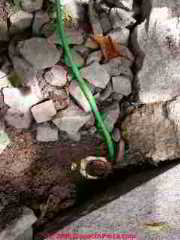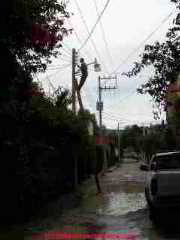 Loss of Neutral & Electrical Ground Can Both Occur at a Building - Dangerous Results
Loss of Neutral & Electrical Ground Can Both Occur at a Building - Dangerous Results
- POST a QUESTION or COMMENT about what happens when the electrical ground connections are lost at a building
Electrical ground becomes disconnected, corroded, weak, intermittent, or lost: what happens?
This document describes the loss of both neutral (utility company) and local building ground connections at a building leading to loss of electrical power and dangerous risk of electrocution.
We report on a case history of utility company electrical neutral wire connection lost leads to lost electrical power and dangerous shock hazard; Case history of double electrical fault: lost electrical company neutral AND lost local ground to earth; How to inspect the electrical ground system: wires, grounding conductors, connectors, ground rods
InspectAPedia tolerates no conflicts of interest. We have no relationship with advertisers, products, or services discussed at this website.
- Daniel Friedman, Publisher/Editor/Author - See WHO ARE WE?
Case History of an Lost Electric Company Neutral AND a Local Electrical Ground Failure:
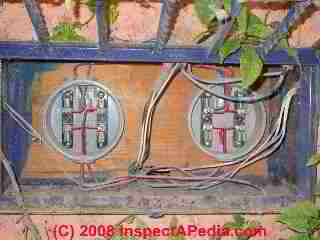 Double Fault Leads to Loss of Electrical Power in San Miguel de Allende, Mexico
Double Fault Leads to Loss of Electrical Power in San Miguel de Allende, Mexico
“Grounding”, article 250 in the NEC, is probably one of the most difficult of the often used articles. In 2005 article 250 became “Grounding and bonding”. In the 2008 NEC there has been a major revision in language, and phrases like “shall be grounded” have changed to “shall be connected to an equipment grounding conductor.”
The example discussed in this article helps explain what happens when the neutral connection to the utility company, or the ground connection at a building or both are lost.
Also, see details about electrical grounding
at ELECTRICAL CIRCUITS, SHORTS,
and at OLD HOUSE ELECTRICAL SYSTEMS
and at ELECTRICITY BASICS, HOW IT WORKS.
Never assume anything during a building inspection. For example, never assume that because you see that ground wires are present, that the building and its electrical system are safely grounded.
First of all, there are usually at least two possible return-current connections at a building:
One is the incoming neutral wire from the electrical service - grounded somewhere by the utility company - don't' assume that it's connected.
The second is the local electrical ground (connection to earth, typically through a ground rod or grounding electrode (sometimes water piping) at a building. This is the building's own local connection to earth through one or more grounding electrodes, or in older buildings, possibly by a connection between the electrical panel's ground bus and a metal water pipe entering the building from outdoors.
Also see ELECTRICAL GROUND REQUIREMENTS
Dim lights and no refrigerator after a storm: In a home in San Miguel de Allende, Guanajuato, Mexico after a severe rain storm the building's lights were severely dimmed. If the occupants turned on any high-amperage device such as a toaster or refrigerator, the lights began to flicker.
The home's refrigerator motor would not even start. We assumed (that was the first mistake) that the building's connection to the electrical utility company's overhead service wire had been lost because we saw that wet tree branches had leaned over, pulling on the service drop wire.
Measuring electrical voltage showed that 120V was available at the wiring lugs in the electric meter base (photo below), but when any electrical load was placed on the building electrical system voltage plummeted.
After more than a week of haggling with CFE, the electric utility company, and after watching their service tech climb poles, cut and re-make electrical connections to the building's service entry cables, nothing was changed,and the building still did not have functional electrical power.
Here is a common dual electric meter setup at a single family home in Mexico. The blue wire entering at upper right is the 120V "hot" wire bringing in 120Volts to this pair of electric meter bases which are wired in parallel. We pulled the electric meters to give an easy view of the wiring itself. This setup simply splits the electric bill into two parts.
Each electric meter feeds one side of the electrical panel indoors.
Circuits in the building are thus fed from one or the other electric meter. Why people do this bears explaining: all that this dual meter setup is doing is splitting the electric bill into two bills.
People do this when they want to create an apartment whose tenant pays their own utilities, or in some cases because the size of a utility bill can affect the electricity rates. In this home there is no apartment.
The second meter was installed by prior owners who thought they were obtaining doubling the electrical power at their home. They were completely mistaken.
Above the incoming blue "hot" wire (the service drop wire) you can see the aluminum ground wire coming from the utility pole and being fed into the meter enclosure from the overhead electrical service drop. Everyone was focused on testing the "hot" blue wire back to the pole and we forgot to also test the ground wire back to the same pole.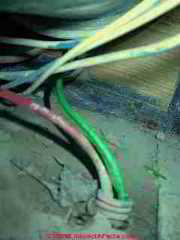
The wrong diagnosis of a bad service drop hot wire: Together with the utility company employee who came to the site, we concluded that our service entry cable had been damaged and was shorting to ground somewhere, and we ordered a replacement. The CFE employee left to obtain a replacement cable (and did not return).
Before the replacement service entry cable could be installed, we asked for some additional diagnostic help from a local electrician familiar with electrical wiring problems in Mexico.
Figuring out what was wrong - a bad service drop ground wire: The electrician too thought at first that the problem was a shorting service drop cable. But we also discussed the alternative possibility that the problem could be not the loss of the building's incoming or "hot" service entry wire, but rather the loss of the building's ground connections.
No ground-connection means no current flows in a building's electrical circuit. A very weak connection between a building's electrical system and earth could result in power loss when the electrical system was under load - not enough electrons could flow to earth.
The loss of the building ground connection seemed unlikely.
After all, we could see a grounding electrode driven into the soil (for some unknown depth) and surely, all that rain had wet the soil, improving the ground connection.
The photo below shows the original building local ground wire (red) connected to the original building grounding electrode. (The green wire was added as we explain below).
A simple electrical system grounding experiment told the story of a double fault in both the utility company's ground and the building's local ground connection: the electrician made a temporary grounding connection between our electrical panel and an incoming metal municipal water supply pipe.
Suddenly all of our lights went on and everything worked.
Our photo above of the electric meter enclosure shows the temporary green ground wire that the electrician connected between the meter-ground (which also connected to our electrical panel ground and neutral buses).
Our photo at left shows the ground wire wrapped around the building's incoming water pipe. (A clamp would be added later.)
In the photos we show here we had not yet found and installed a proper grounding clamp to secure the ground wire to the water pipe.
A ground wire that is just wrapped around a water pipe is certainly not a reliable connection, but it was sufficient to demonstrate that providing a good local ground at the building turned the lights back on.
We determined that the building had experienced a "double fault" in its grounding system: the local building ground had always been inadequate. But when the storm damaged and pulled loose our overhead connection to the utility company's ground system, we had lost our second connection to earth.
While waiting for the electrical utility company, CFE (Comision Federal de Electricidad) in San Miguel to get around to fixing their own ground ("cable de tierra") back at their pole, the electrician installed a new and longer grounding electrode at the building's electrical service.
Loss of all building ground connections was extremely dangerous: Assuring that the building had at least one working ground was very smart. The near total loss of electrical grounding at this building could certainly have killed someone.
Keeping the building well grounded: At this building the electrician kept the additional bond between the local ground system and the local municipal water pipe as well as installing a new grounding electrode.
Having a local electrical ground at the individual building is very important, to give the building electrical system a ground reference point, and for surge dissipation, but the local electrical ground at a building should never be the only path for return current. -- J.P. Simmons
Additional comments from Bud, a master electrician in Minnesota:
Looking at the pictures makes me appreciate the NEC.
I read the newsgroup alt.home.repair, which probably gets most of the US power wiring questions. A few times a year there are problems which are caused by a bad utility *neutral* connection. In the 240/120V US system, (where the 240V transformer is center tapped to provide 120V) if the service neutral is lost the balance of the 2 - 120V legs is lost.
With just a space heater on one side and just a light bulb on the other side the light bulb can get real bright (briefly). The path through the N-G bond and the earth back to the transformer helps a little but can’t prevent serious unbalance.
My understanding of this Mexico story is that what was lost was the utility neutral, not the utility ground (IMHO another error). A neutral is a current carrying conductor. A ground does not normally carry current.
With no utility neutral, all the power has to return to the utility transformer through the “ground” wire. With higher resistance to earth at the start, most of the voltage is lost in the earth path.
When the ground was attached to a metal water pipe, the path was probably through the pipe to neighbor(s), through their service N-G bond, and back through their service neutral (which your article probably says). (This can also happen in the US, and was in a recent thread at alt.engineering.electrical).
Other risks remain when the utility company ground is not effective: After this temporary fix we were still very nervous about the missing utility company ground. Why? Because we don't know how many other homes may be affected by the failure in the utility company's ground system
. The fact that only our building lost power does not mean that we were the only one connected to this "bad ground" back at the pole - it could simply be the case that the other houses on the street each had their own good local ground connection.
But should someone else's ground connection fail, and should the utility company's ground connection remain un-repaired, then our neighbors could be depending on our local ground wire (which is pretty small) for their own safety - a dangerous dependence.
The utility company ground was finally restored when CFE, the electric utility company, routed a new neutral wire between the building's electrical meters and their overhead neutral wire.
Our case study of a shock and fire hazard in a garage shows what happens when a local ground is the only connection to earth at a property and when that condition combines with other wiring defects. Readers of this article should also be sure to
review SAFETY HAZARDS & SAFE ELECTRICAL INSPECTION PROCEDURES for Inspectors examining Residential Electrical Systems
and Local Electrical Grounding for safety procedures during inspection of the grounding system.
...
Reader Comments, Questions & Answers About The Article Above
Below you will find questions and answers previously posted on this page at its page bottom reader comment box.
Reader Q&A - also see RECOMMENDED ARTICLES & FAQs
On 2020-10-23 - by (mod) -
Angela
Watch out:
Melting co-ax computer cables very possibly point to an IMMEDIATE DANGER of FIRE or Shock injury.
Those cables do not normally carry electrical current. If the house is improperly grounded or has some other wiring error that could indeed cause what the tech pointed out to you.
You should
Notify the landlord immediately of a life-safety issue. Turn off electrical power - I know this is easy for me to say and not convenient to do, but sitting at a remote spot faced with the unsafe condition you describe is not one from which I can be careless;
You need an electrician on site promptly. This isn't a WiFi problem it's a fire and shock hazard problem that can be fatal.
On 2020-10-23 by Angela
I rent a small apartment in my landlord's house. I recently replaced my modem and router and I still don't have Wi-Fi. Technician showed me the coax connections on the outside of the house and they were melting and drawing more amps than it should. He said that the house ground is compromised.
My landlord downstairs still has Wi-Fi so he refuses to do anything about it. Is this dangerous? And should I call the electric company or hire an electrician? I need my Wi-Fi !! Need advice on what to do to remedy the situation.
On 2020-09-10 - by (mod) -
An electrician can, using simple test equipment, determine if there is a lost neutral wire on the utility company side or on your side of the electric meter.
Where in MN? I'm often in Lake county
On 2020-09-10 by Minnesota Neutral Wire Issue
We were hit by a tornado in September 2018. It took down the power lines in the road ditch and lost electricity for 4 days. The tornado took half our main shop site which also had our solar panels on. We lost one appliance at that time. Since then everything has been rebuilt including solar. August 2019 we lost several items due to a "neutral" wire issue. August 2020 again we are sitting without a stove, microwave, furnace, treadmill, etc. The utility company is stating a neutral wire issue. I need some help on where to start. It is the utility or our home residence?
On 2020-03-25 - by (mod) -
Sounds like you need an onsite electrician to be sure your electrical system is safe, Jessica.
Also be sure to check with your doctor.
On 2020-03-24 by Jessica kellogg
Grounds keeper has loose ground wire using electricity to male me weak
On 2012-04-20 15:12:47.936193 by coump@aol.com
Is a exposed neutral in a service cable dagerous especialy at eye level
On 2020-03-25 - by (mod) - can your electrical system ground make you sick?
Sounds like you need an onsite electrician to be sure your electrical system is safe, Jessica.
Also be sure to check with your doctor.
On 2020-03-24 by Jessica kellogg
Grounds keeper has loose ground wire using electricity to male me weak
On 2019-09-09 - by (mod) -
Keep me posted on what you're told or what you find is that will certainly help other readers
On 2019-09-08 by JR
Yes, Sir. I would shut off the circuit immediately. And, thank you, for the "terrified" editorial.
On 2019-09-08 - by (mod) -
The discussion is helpful to other readers too, JR; while waiting for an electrician whom you trust, if you see a circuit that's apparently misbehaving: flickering lights, for example, or buzzing sounds, shut that circuit off immediately to reduce the chance of an fire.
You may also enjoy this editorial opinion about what happens to people who call for repairs while sounding terrified:
OTHER PEOPLE's MONEY https://inspectapedia.com/home_inspection/Other_Peoples_Money.php
On 2019-09-08 by JR
I am grateful for your responses, and for your direction to additional articles. Know that I have read them.
I understand that you were posing hypotheses, but expertly, as opposed to my "what's electricity?" ignorant hypotheses. An added concern is that, without a doubt, in this old house there may well be "wiring problems," and you know what happens at a mechanic garage when you pull in with your 20 or 30 year old vehicle.
I want the source identified and remedied, not the "buy a new one." I also don't want some inventive "patch" job, if the house system should be the cause, or contributing. Eh.
You pay your money, (IF you can get someone to take the service call, and you take your chances. (My going on about it is taking up valuable space. Please do not think this should remain and clutter).
On 2019-09-08 - by (mod) - oscillating low Hz noise problem diagnosis
Agree that other causes are far more likely; I was but inventing some possible avenues of investigation IF one had reason to suspect the electrical system ground.
We have published quite a few articles on tracking down the source of noises or sounds in and around buildings.
SOUND EVENT LOG
A complete index to sound and noise diagnosis procedures is at ARTICLE INDEX to BUILDING NOISE DIAGNOSIS
On 2019-09-08 y JR
Thank you. This is an oscillating low Hz. You see, I have yet to find reference to this type of sound in relation to ground loop. Last night was the worst, and strongest, it has been since March. At 3AM - since I couldn't get to sleep - I could hear the sound clearly, outside
. I would like to think that fact furthers diagnostics, as the sound is not solely within the house. If I could get the nearby electric and plumbing guy to come here, that would help. (I hope).
On 2019-09-0 - by (mod) - Can loss of ground account for continuous, intense, low Hz oscillating sound
JR
Perhaps - some electrical system defects could result in noises from overheating connections or malfunctioning equipment. For example, when the electrical ground was lost at the home used as the example for the article above on this page, the ground path found its way to earth through a single small wire that ultimately overheated and burned-up leading to loss of all power. But before the power was lost, an overheating connector made a sizzling noise.
A search using the Search Box above, to look for ELECTRICAL SYSTEM NOISES
finds the article that you should review
On 2019-09-08 by JR
Can loss of ground account for continuous, intense, low Hz oscillating sound within a home. Can the addition of a condensing boiler with attachment to sump pump pipe cause this problem nearly two years after installation. Could the power company replacement house connector cause this problem. Thank you.
On 2017-06-07 2 - by (mod) -
Indeed the sounds like a bad electrical connection possibly between the service entrance cable and your electrical box main lugs, or there could be corrosion and connection problems within the electrical box as well. What's the brand of this electrical panel? Is it a zinsco or FPE?
And is there aluminum wiring in the building?
On 2017-06-07 by Anonymous
Light on the AC, or power strip but won't run anything! HELP
On 2017-06-07 by Deb
Power from the pole is good...the power in my shop is not enough to run anything, only light up the button on TV, or light on a
On 2013-04-01 - by (mod) -
Bill,
Not necessarily.
First off, if you are certain that you turned off the breaker supplying the circuit you were testing, and if you then found live voltage on the black (hot) wire, I suspect the breaker was not "OFF" internally. I'd bet a dollar that it's an FPE Stab-Lok breaker in that case. (Search InspecAPedia for FPE StabLok)
Another less likely problem is mis-wiring.
On 2013-03-31 by Bill Durham
HI. I turned of the breaker to the circut, tested it with volt meter. Touched the white wire and air duct at air handler (big duck) and nothing happened. I touched the black wire and the same duck work and love....knocked my butt. Re checked everything with volt meter and still, with the right breaker turned off the black wire and duck wire shock, carried current on the meter. Do I have a grounding problem. thanks
On 2012-12-18 - by (mod) - Can electricity ever come out of the ground socket by mistake in an apartment building?
Grounding body - that test sounds a bit iffy to me.
On 2012-12-17 by Grounding body in apartment buil
.. the electrician just stuck one end of the voltmeter into the ground the other into hot and the mains switched off so he said it was grounded.
Hi, I live in an apartment building and an electrician said the grounding socket worked with a quick test using a voltmeter (I think) but said he could do further testing with more elaborate equipment. I want to strap a copper cable to my body and insert the other end into the ground socket. I wake up feeling better. Is this dangerous?
Can electricity ever come out of the ground socket by mistake in an apartment building? The bed wouldn't be grounded. I keep the mains turned off for the powerpoint in question? Is there a circuit breaker device I could or should use between the socket and the cable just in case? Thanks-in-advance.
On 2012-06-09 - by (mod) - signs of multiple electrical faults
Dennis, I can only guess at multiple faults occurring at your cottage:
Somewhere you could have a hot wire that is contacting metal in your gutters or contacting metal siding that in turn contacts gutters and downspouts
The gutters (and siding) are not themselves properly grounded to earth - something that is recommended. If they were grounded, when an electrical fault in the building anywhere connected a hot or live wire to the siding or gutters a fuse would blow or breaker trip.
It is possible that the grounding electrode is ineffective.
For example if the electrode is too short (a "shortcut" we've come across more than once in the field) then the electrode's contact with earth could be inadequate to provide a good, effective local ground. In that case, if combined with a connection between the electrode and the building siding, gutters, downspouts, indeed a return-to-earth current could give you a bite when you are both touching a gutter (or siding) and are yourself connected to earth (say via an aluminum ladder or by standing on wet ground).
Yes, if the grounding conductor is not well connected to the grounding electrode, that too could make the local ground ineffective. That connection is usually easy to observe and test.
Let us know what you find, and use the CONTACT US link to send along photos that might permit more comment or may help other readers.
On 2012-06-06 by Dennis
I have a cottage in Canada....up on blocks. Ground wire is attached to a spike in the ground by utility co. Went to clean my gutter and got a shock from the gutter. Would this be a problem where the wire is attached to the spike?
...
Continue reading at LOST NEUTRAL SHOCKS HOMEOWNER or select a topic from the closely-related articles below, or see the complete ARTICLE INDEX.
Or see these
Recommended Articles
- DEFINITION of ELECTRICAL GROUND
- ELECTRICAL CIRCUITS, SHORTS
- ELECTRIC PANEL INSPECTION
- GROUND SYSTEM INSPECTION - home
- ELECTRICAL GROUND ERROR-CAUSED LEAKS
- FALSE GROUND at RECEPTACLES
- FALSE GROUND, BOOTLEG & FLICKERING LIGHTS
- FALSE NEUTRAL CONNECTIONS
- GAS PIPING GROUND BOND
- LIGHTNING PROTECTION SYSTEMS
- LOST ELECTRICAL GROUND
- LOST NEUTRAL SHOCKS HOMEOWNER
- SERVICE GROUNDING DEFECTS
- GROUND SYSTEM REQUIREMENTS
- KNOB & TUBE WIRING
Suggested citation for this web page
LOST ELECTRICAL GROUND at InspectApedia.com - online encyclopedia of building & environmental inspection, testing, diagnosis, repair, & problem prevention advice.
Or see this
INDEX to RELATED ARTICLES: ARTICLE INDEX to ELECTRICAL INSPECTION & TESTING
Or use the SEARCH BOX found below to Ask a Question or Search InspectApedia
Ask a Question or Search InspectApedia
Questions & answers or comments about what happens when the electrical ground connections are lost at a building.
Try the search box just below, or if you prefer, post a question or comment in the Comments box below and we will respond promptly.
Search the InspectApedia website
Note: appearance of your Comment below may be delayed: if your comment contains an image, photograph, web link, or text that looks to the software as if it might be a web link, your posting will appear after it has been approved by a moderator. Apologies for the delay.
Only one image can be added per comment but you can post as many comments, and therefore images, as you like.
You will not receive a notification when a response to your question has been posted.
Please bookmark this page to make it easy for you to check back for our response.
IF above you see "Comment Form is loading comments..." then COMMENT BOX - countable.ca / bawkbox.com IS NOT WORKING.
In any case you are welcome to send an email directly to us at InspectApedia.com at editor@inspectApedia.com
We'll reply to you directly. Please help us help you by noting, in your email, the URL of the InspectApedia page where you wanted to comment.
Citations & References
In addition to any citations in the article above, a full list is available on request.
- Mark Cramer Inspection Services Mark Cramer, Tampa Florida, Mr. Cramer is a past president of ASHI, the American Society of Home Inspectors and is a Florida home inspector and home inspection educator. Mr. Cramer serves on the ASHI Home Inspection Standards. Contact Mark Cramer at: 727-595-4211 mark@BestTampaInspector.com
- John Cranor [Website: /www.house-whisperer.com ] is an ASHI member and a home inspector (The House Whisperer) is located in Glen Allen, VA 23060. He is also a contributor to InspectApedia.com in several technical areas such as plumbing and appliances (dryer vents). Contact Mr. Cranor at 804-873-8534 or by Email: johncranor@verizon.net
- Thanks to James P. Simmons, Mr. Electric, for technical review and advice on this material. 9/19/2008. Jim P. Simmons, Mr. Electric, Licensed Master Electrician, 1320 Dayton Street SE, Olympia, WA 98501, 360-705-4225, Fax 360-705-0130 or by email to mrelectricoly@msn.com
- Special thanks to Bud - a master electrician in Minnesota who contributed text and suggestions for explaining why we need electrical grounding, electrical neutrals, and for discussing the shortcomings of neon testers and plug-in receptacle testers - 1/22/2009
- * Safety Hazards and Safe Inspection Procedures for Electrical and Home Inspectors at Residential Electric Panels
- Aluminum Wiring Information WebsiteAluminum Electrical Wiring Hazards and Repairs: in-depth authoritative info, photos, documents including selection of proper vs. ineffective repair methods. E.g.: Ideal 65 "Twister" purple connector fails in field and lab testing with aluminum wire.
- Ampacity of an Electrical Service: How to determine the electrical service size or ampacity entering a building
- Circuit Breaker, a bad one fails to trip failure at aluminum bus-to-circuit breaker connection - field report and photographs
- Electrical Panels, How to Inspect in buildings, safety for electrical inspectors, electrical panel, fusing, wiring defects, defective products. Inspection Class Presentation
- Federal Pacific Electric (FPE) Stab-Lok Circuit Breaker Panel Hazards Website - Latent fire hazards, in-depth authoritative research, documents, advice on Stab-Lok electric panel and circuit breaker failures and what to do when this equipment is found in buildings.
- Zinsco Electrical Circuit Breaker Failures: overheating, failure to trip, burn-ups involving Zinsco and certain Sylvania electrical panel components - page under development March 2006.
- "Electrical System Inspection Basics," Richard C. Wolcott, ASHI 8th Annual Education Conference, Boston 1985.
- "Simplified Electrical Wiring," Sears, Roebuck and Co., 15705 (F5428) Rev. 4-77 1977 [Lots of sketches of older-type service panels.]
- "How to plan and install electric wiring for homes, farms, garages, shops," Montgomery Ward Co., 83-850.
- "Simplified Electrical Wiring," Sears, Roebuck and Co., 15705 (F5428) Rev. 4-77 1977 [Lots of sketches of older-type service panels.]
- "Home Wiring Inspection," Roswell W. Ard, Rodale's New Shelter, July/August, 1985 p. 35-40.
- "Evaluating Wiring in Older Minnesota Homes," Agricultural Extension Service, University of Minnesota, St. Paul, Minnesota 55108.
- "Electrical Systems," A Training Manual for Home Inspectors, Alfred L. Alk, American Society of Home Inspectors (ASHI), 1987, available from ASHI. [DF NOTE: I do NOT recommend this obsolete publication, though it was cited in the original Journal article as it contains unsafe inaccuracies]
- "Basic Housing Inspection," US DHEW, S352.75 U48, p.144, out of print, but is available in most state libraries.
- Rust and Corrosion in Electrical Panels, A Study and Report on Frequency and Cause for Electrical and Home Inspectors at Residential Electric Panels
- Directory of Home Inspectors accessible via internet
- In addition to citations & references found in this article, see the research citations given at the end of the related articles found at our suggested
CONTINUE READING or RECOMMENDED ARTICLES.
- Carson, Dunlop & Associates Ltd., 120 Carlton Street Suite 407, Toronto ON M5A 4K2. Tel: (416) 964-9415 1-800-268-7070 Email: info@carsondunlop.com. Alan Carson is a past president of ASHI, the American Society of Home Inspectors.
Thanks to Alan Carson and Bob Dunlop, for permission for InspectAPedia to use text excerpts from The HOME REFERENCE BOOK - the Encyclopedia of Homes and to use illustrations from The ILLUSTRATED HOME .
Carson Dunlop Associates provides extensive home inspection education and report writing material. In gratitude we provide links to tsome Carson Dunlop Associates products and services.


